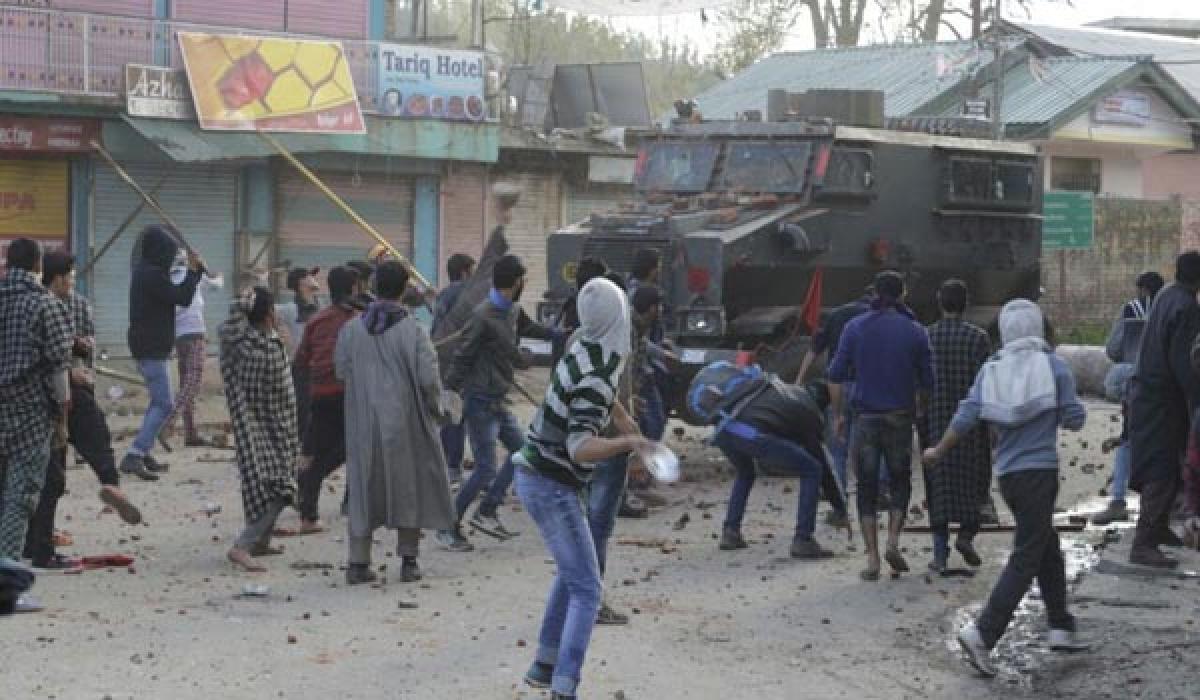Live
- NASA Tracks Five Giant Asteroids on Close Approach to Earth Today
- Pushpa 2 Hits ₹1000 Crore in 6 Days: How It Compares to Other Top Indian Films
- Vivo X200 and X200 Pro Launched in India: Price, Specifications, and Features
- Nitin Gadkari Admits Feeling Embarrassed at Global Summits Over Rising Road Accidents in India
- Opposition Slams ‘One Nation, One Election’ Bill as Anti-Democratic; BJP Allies Support the Move
- Celebrate Karthigai Maha Deepam Virtually with Sri Mandir’s LIVE Darshan Experience
- BJP Extends Support to Samagra Shiksha Abhiyan Employees' Strike, Demands Immediate Regularization and Welfare Benefits
- Dr. M. Priyanka Stresses Quality Education, Nutritious Meals, and Cleanliness in Schools
- Mandal Level CM Cup Sports Concludes in Ija with Promising Talent and Enthusiastic Participation
- Harish Rao Slams Revanth Reddy: "More Talk, Less Action"
Just In

Srinagar:It has been a month since the current unrest began in the Kashmir Valley, shattering years of relative stability in a state ravaged by one of the longest-running armed conflicts in the world. On July 8, when security forces gunned down Kashmir\'s rebel commander Burhan Wani in a controversial gunfight, nobody imagined that the turmoil triggered by his killing would be so widespread and ext
Srinagar:It has been a month since the current unrest began in the Kashmir Valley, shattering years of relative stability in a state ravaged by one of the longest-running armed conflicts in the world.
On July 8, when security forces gunned down Kashmir's rebel commander Burhan Wani in a controversial gunfight, nobody imagined that the turmoil triggered by his killing would be so widespread and extend this long.
But exactly a month since, the valley remains on the edge. The pro-freedom demonstrations and clashes between protesters and security forces have become routine. Over 56 persons have died and more than 5,000 have been injured -- many are still in hospitals.
The valley is seething with anger, with many terming it as a "new phase of freedom struggle" and a "now-or-never" situation.
The valley has suffered huge losses with businesses, schools and offices shut amid continuous curfew by the government and shut down by separatists. India has blamed Pakistan for fomenting the unrest.
The protests erupted spontaneously after the killing of Wani -- a 22-year-old social media-savvy Hizbul Mujahideen commander -- who had a huge following among younger Kashmiris. Tens of thousands of mourners, who later turned violent with stone-throwing, rallied across the valley. They were met with bullets and pellets by security forces.
Wani was not the first militant commander killed by security forces in Kashmir. In fact, he is considered no match for early armed militants like Ishfaq Majid, the founder of Jammu and Kashmir Liberation Front, and others, killed in the early years of militancy that began in the late 1980s.
Wani surely was not as popular as Afzal Guru -- the 2001 parliament attack convict -- who was hanged in Delhi's Tihar Jail on February 9, 2013.
The killings of these militant leaders did trigger anger. But none of the unrest was as violent and as widespread as the latest one.
How did the death of this young militant bring the valley to such a violent standstill that refuses to fizzle out even after 31 days?
Political pundits say Wani's death was just a trigger. The anger had been building up over many controversial issues dominating the political narrative in Kashmir.
Among them, a pro-India politician said, is the "unnatural ruling alliance" of the Bharatiya Janata Party (BJP) and regional Peoples Democratic Party (PDP).
Both fought the 2014 assembly elections against each other, promising to keep each other away from power in India's only Muslim-majority state.
While the PDP wooed its voters with a soft-separatist plank of fighting for "self-rule", the BJP promised to revoke Article 370 of the constitution that gives Jammu and Kashmir a special status in India.
In the end, electoral arithmetic forced both to join hands and forget their differences. But people may not have forgotten the PDP's electoral plank.
"The PDP brought the BJP and RSS (Rashtriya Swamsevak Sangh) to rule a state where they could only dream of getting a foothold. Now they are ruling us," said Rashid Ahmed Mir, a Kashmir University scholar.
"It was molten rock waiting to erupt. It has been building up since the hanging of Guru," Mir told IANS, recalling how a common Kashmiri still feels that the Jaish-e-Mohammed activist didn't receive a fair trial over his involvement in the December 13, 2001, attack on the Indian parliament.
Mushtaq Ahmed Malik, a former separatist leader, said one cannot also ignore the BJP's rhetoric and proposal to build housing colonies in Kashmir for the families of retired soldiers and Hindus who fled the valley fearing for their lives at the start of the armed insurgency.
"All these proposals have been unpopular among Kashmiri Muslims. And then came the ban on selling beef in Kashmir. Kashmiris felt they were being pushed to the wall," Malik said.
Chief Minister Mehbooba Mufti's PDP had also promised to initiate a dialogue between India, Pakistan and Kashmiris to resolve the 70-year-old territorial dispute stemming from the India-Pakistan partition in 1947.
But the BJP has been continuously ruling out any possibility of talking to Kashmiri separatist leaders or even to Pakistan.
"These broken electoral promises contributed to the anger and revived the separatist sentiments after years of relative peace," said Malik. These issues, he said, have largely driven the current unrest in Kashmir.

© 2024 Hyderabad Media House Limited/The Hans India. All rights reserved. Powered by hocalwire.com







